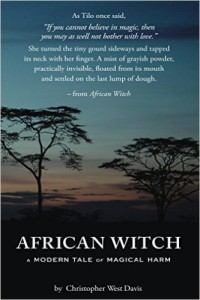Review — AFRICAN WITCH by Christopher West Davis (Kenya)
African Witch: A Modern Tale of Magical Harm
By Christopher West Davis (Kenya 1975-78)
Create Spack
February 2016
418 pages
$16.95 (paper), $9.95 (Kindle)
Reviewed by Peter Van Deekle (Iran 1968-70)
•
Christopher West Davis draws upon his Peace Corps service experience in Kenya (1975-78) for his recent novel (2016) African Witch: A Modern Tale of Magical Harm. His career as a journalist also helps to inform his detailed and insightful depiction of characters and place in this suspenseful story of young Americans living and working in modern-day Kenya.
On one level Davis creates a story about Westerners new to Kikuyu ways, imposing upon their encounters with native people and their attendant perceptions, a distinctly Western attitude. On the other hand, this novel gains its energy and momentum from the author’s ability to maintain a dramatic tension among the characters and the events that surround and engulf them.
Despite its material and social advances, Kenya, West suggests, continues to be subject to the myths and superstitions of its tribal cultural past. And this contrast forms the basis for a multi-layered plot of intrigue and mystery.
The novel opens on the visit of two Dutch tourists who, despite years of marriage and hopes for children, cannot conceive. In a local marketplace the wife encounters an elderly Kenyan woman who enchants her (almost literally) with the offer of an herbal potion. The tourist purchases the drug and the couple fantastically dies soon after using it.
The deaths of the two visiting tourists are only the first indications of a series of mysterious and unexplained mishaps and deaths of white foreigners associated with the old woman (Beatrice Wakeawa), and the local newspapers report “Witchcraft Suspected in Deaths of Dutch Tourists.”
The novel illustrates the mystical significance of twin births which the “African witch” Beatrice recognizes throughout the tale. She finds an egg with twin yolks, and, later in the book there is the death of twin boys. Uniting Africa with Americans, young female Peace Corps Volunteer Nina Blanchard is linked to her twin sister, Madeleine, a novice in the local Kenyan convent. The intertwining of these twins plays out through their mistaken identities and police investigations.
Christopher West Davis reflects every foreigner’s confrontation with a host culture’s (Kenya) unknown traditions and local customs. At the center of this confrontation are two young Peace Corps volunteers who are romantically connected. Each brings a skillset and commitment associated with their assigned service, while being portrayed as distinct and individual players in a rapidly unfolding mystery — with tragic results.
Nina is in love with her American site-mate, Rick Skinner, and despite Peace Corps regulations, they maintain a romantic relationship. The novelist reflects on a prevailing sentiment that some Peace Corps volunteers recognize. He expresses these sentiments through Rick, an enterprising man who has produced and covertly marketed a local insect control agent. Rick reads from a Kenyan editorial “ . . . about Peace Corps people. Are they worth it? They have run away from their own responsibilities at home and come here and act superior to our peoples, my people who are facing their responsibilities every day. They fill jobs Kenyans could take. These unskilled workers trying to play God.”
The novel ends with an ambiguous end for Beatrice, the “African witch,” who is sentenced to hang” for her “taste of bloody revenge.” Is she alive after all? While Nina Blanchard, who loses the persons closest to her, decides to return to and remain in Kenya beyond the Peace Corps assignment that brought her there in the first place.
•
Peter Van Deekle (Iran 1968-70) began his Peace Corps service informally in the summer of 1963, as a teenage volunteer at headquarters in Washington, D.C. From that time onward he planned to serve abroad, and joined the 20th group of volunteers to Iran in 1968, following graduation from the University of Pennsylvania (which, coincidentally, was highly influential in shaping many of Pahlavi University’s [Shiraz] departments and institutions. Deekle met his wife, Barbara Maier (Iran 1968-70) during service and both taught English in local schools. He has been an academic administrator in a variety of public and private colleges and universities since his return to the United States and currently, having retired to the Washington, D.C. area where he is the Community News Editor for the National Peace Corps Association. He and his wife live near one of their two children in suburban Maryland.

No comments yet.
Add your comment